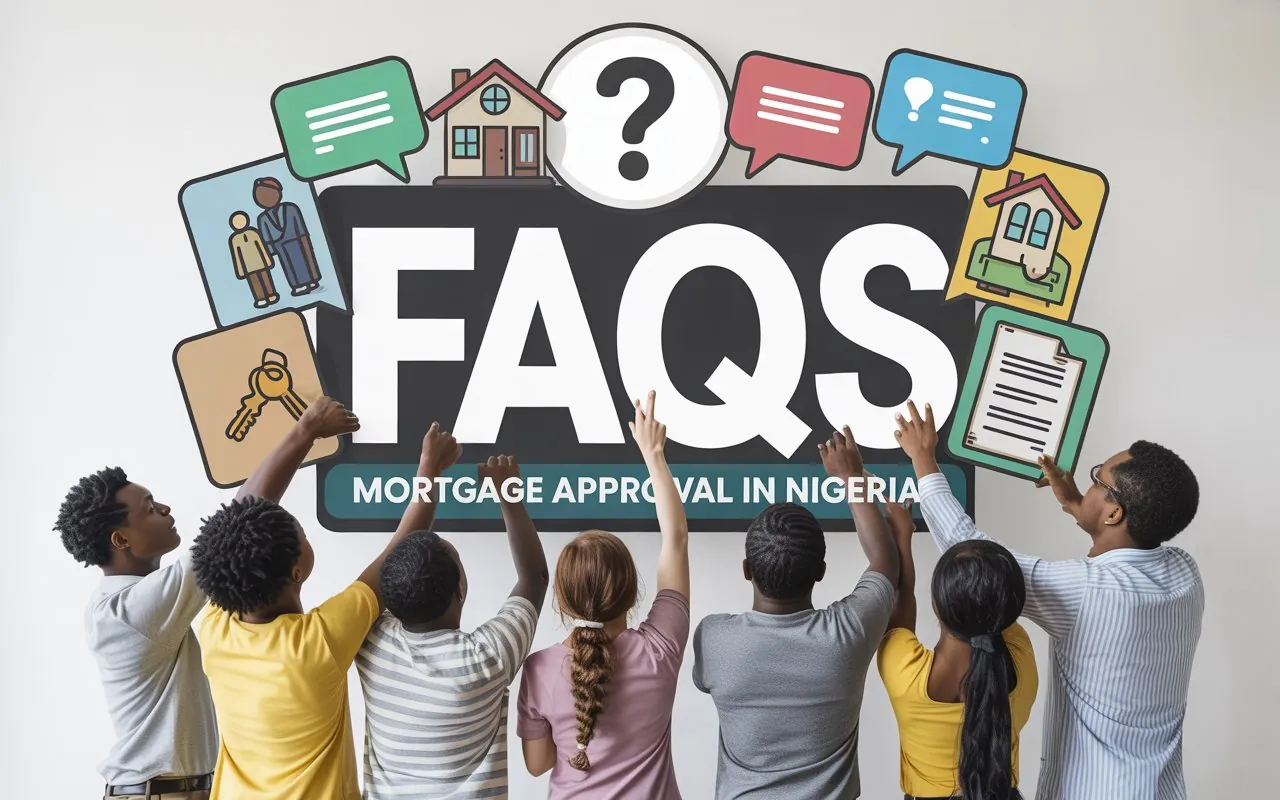Dreaming of owning your own home in Nigeria is a powerful goal, but transforming that dream into reality begins with one vital step—securing mortgage approval. For most buyers, especially in dynamic urban centers like Lagos and Abuja, a mortgage isn’t just an option; it’s the only feasible path to acquiring property as values rise and the market grows increasingly competitive.
Understanding how to get approval for mortgage is not just about crossing off a checklist—it’s about building your financial future, ensuring your family’s security, and taking ownership of an asset that could appreciate for generations. In today’s market, a successful mortgage approval can open the door to better neighborhoods, top schools, and enhanced quality of life. It also grants first-time buyers and experienced investors alike the flexibility and leverage to negotiate confidently in a market where cash buyers and inflation are ever-present challenges.
However, the mortgage landscape in Nigeria has its own unique complexities. Unlike in some countries, the approval process here is shaped by tighter credit policies, currency fluctuations, documentation challenges, and evolving regulatory requirements. Many applicants, regardless of their background or income bracket, find the process confusing or intimidating at first. Often, simple missteps—missing paperwork, misinterpreting bank requirements, or applying at the wrong time—can lead to costly delays or outright denials.
The good news? With careful planning, clear information, and a strategic approach, you can dramatically increase your chances of swift, stress-free mortgage approval. Knowing what lenders look for, how to organize your finances and documents, and how to present yourself as a trustworthy borrower puts you miles ahead of other applicants. You don’t just boost your odds—you position yourself to negotiate better rates, faster disbursements, and long-term peace of mind.
This comprehensive guide is designed for every Nigerian who wants to master the process with confidence. Whether you are a young professional saving for your first apartment, a growing family looking to expand, or an entrepreneur interested in leveraging property for business growth, the information, tips, and expert insights ahead are tailored for you.
We’ll break down the process step by step, demystifying every phase and revealing the strategies that banks, brokers, and seasoned buyers use to unlock mortgage approval in even the toughest markets. Let’s embark on this journey together and move you one step closer to unlocking the keys to your new home.
Understanding Mortgage Approval: Fundamentals & Importance

What Is Mortgage Approval?
Mortgage approval is the process where a lender evaluates your finances, work history, credit history, and desired property to decide if you qualify for a home loan. This comprehensive review involves several stages: pre-qualification, pre-approval, underwriting, and final approval.
- Pre-qualification: A basic calculation based on self-reported finances. It’s a rough estimate, not a guarantee.
- Pre-approval: A documented, conditional promise from a lender stating how much they might lend you, valid for a set period.
- Full approval: The lender has reviewed all documents, verified the property, and issued a commitment letter.
Nigeria’s Unique Mortgage Landscape
Understanding the Nigerian context is vital when exploring how to get approval for mortgage.
- Fragmented lending market: Commercial banks, primary mortgage banks (PMBs), and government schemes (e.g., NHF) offer different criteria and products.
- Documentation requirements are evolving: The CBN’s focus on anti-money laundering and BVN compliance means stricter paperwork.
- Urban vs. rural access: Approval is more straightforward for properties in urban, titled areas. Rural or informal titles introduce complexity.
- Interest rates and tenors: Usually higher and shorter than global averages (12-24% interest, tenors of 5-20 years).
- Currency risk: Some lenders only offer naira-denominated loans, but expats or high-net-worth individuals may access FX mortgages.
How to Get Approval for Mortgage: Step-by-Step Process
Step 1: Assess and Optimize Your Financial Health

Getting approval for a mortgage hinges on the perceived stability of your finances. Here’s how to prepare meticulously:
Review Your Credit Score
- Order your credit report: Use CRC Credit Bureau, FirstCentral, and other approved agencies.
- Dispute errors: Inaccuracies can lower your score—initiate disputes immediately for any incorrect information.
- Understand the score brackets:
- 300-619: Poor—improving before applying is crucial.
- 620-699: Fair—may qualify, but not for best rates.
- 700+: Good—strong candidate; best rates and approval odds.
- Action plan: Settle past-due accounts, pay down cards/loans, avoid new debts for 6-12 months before applying.
Calculate Your Debt-to-Income (DTI) Ratio
- Formula:
DTI (%)=(Total Monthly DebtsGross Monthly Income)×100DTI (%)=(Gross Monthly IncomeTotal Monthly Debts)×100 - Acceptable Limits: Most lenders prefer under 36%. Some stretch to 43% for exceptional applicants.
- Rebalancing Tips: Increase income (side hustle, promotion), consolidate loans, or renegotiate debt repayments.
Establish Consistent, Verifiable Income
- Employees: Steady employment at a reputable company. Prepare 3-12 months’ payslips and stamped bank statements.
- Self-employed: Minimum 24 months of business activity, annual tax returns, financial statements, evidence of regular business inflows, and contracts.
Build and Demonstrate Savings
- Down payment: Save a minimum of 10-20% of the target property price (e.g., ₦80M house = ₦8–₦16M).
- Closing costs: Prepare 3–5% of property value for legal, admin, insurance, and valuation fees.
- Emergency reserves: Buffer savings equal to 3–6 months’ mortgage payments reassure lenders of risk management.
Control and Reduce Existing Debt
- Repay car loans, credit cards, or consumer loans.
- Seek a debt consolidation loan if your DTI is near the max threshold.
- Avoid co-signing for others, as their debt can impact your eligibility.
Examples in Practice
- Emeka’s Strategy: Earns ₦550,000/month, DTI at 30%. Applies for a consolidation loan for underutilized credit card debt, pays old debts, and raises his score by 40 points in 6 months.
- Chioma’s Approach: Entrepreneur records all sales in business accounts, ups tax compliance, and sets up automatic savings for a down payment.
Step 2: Gather, Organize, and Audit Documentation

Mortgage approval in Nigeria is paperwork-intensive—anticipate and overprepare.
Essential Documents Checklist
| Document | Purpose | Pro Tips |
|---|---|---|
| Government ID (driver’s license, passport, voter’s card) | Identity verification | Ensure all names are spelled identically |
| BVN (Bank Verification Number) | Fraud/check compliance | Cross-check your BVN is active |
| Utility bills (3–6 months) | Proof of residential address | Should match with official bank records |
| Letter of employment/Pay Slips | Income and job confirmation | Provide for up to 1 year if possible |
| Bank statements (6–12 months) | Income verification; source of funds | Scan/print from online banking portals |
| Tax clearance certificate | Tax compliance & legal status | Self-employed: provide 2+ years’ returns |
| Statement of assets | Net worth and repayment buffer | Include investments, cars, land, savings |
| Property documents (if applicable) | Confirm asset legitimacy | Offer letter, title deed, valuation report |
Overlooked Documents & Pitfalls
- Name variations: “Obinna U. Okafor” vs. “Okafor Obinna Uche” can derail processing.
- Expired documents: Ensure ID and tax certificates are up to date.
- Missing business documents: For entrepreneurs, provide CAC certificate and business bank statements.
Digital Organization Hacks
- Scan every document in color for legibility and save as PDF.
- Use cloud storage; create folders by document type and year.
- Label consistently: “Payslip_March2025.pdf”, “TaxClearance_2024.pdf”, “UtilityBill_April2025.pdf”.
- Backup with an encrypted drive or reputable cloud provider.
Pre-fill Lender Forms
- Most lenders publish soft-copy application forms for download. Fill these out in advance and proof thoroughly for errors.
Step 3: Comparing, Researching, and Selecting Lenders

Don’t settle for the first lender you meet. The mortgage market in Nigeria is broad but nuanced.
Lender Types
- Commercial Banks: GTBank, Zenith Bank, Access Bank, FirstBank—often well-respected, strict, and may offer lower rates.
- Primary Mortgage Banks (PMBs): Abbey Mortgage Bank, Infinity Trust, Platinum Mortgage. May be more flexible for first-timers.
- Cooperatives/Housing Schemes: Employer-based, trade-union, or community cooperatives.
- Government-Backed Schemes: NHF (National Housing Fund), LagosHOMS, Family Homes Fund.
How to Effectively Compare Lenders
| Lender Feature | What to Check |
|---|---|
| Interest rates | Fixed vs variable; rates for your credit profile |
| Down payment | Minimum amount, flexibility for negotiation |
| Tenor | Loan repayment period, prepayment penalties |
| Total costs | Application, legal, insurance, and hidden fees |
| Approval speed | How long to decision and fund disbursement |
| Customer support | Reviews, accessibility, reputation |
The Interview Approach
- Request a meeting with loan officers at 2–3 institutions.
- Bring your paperwork and test their responsiveness.
- Evaluate their willingness to answer tough questions about hidden costs, early repayment options, and process transparency.
- Request sample amortization schedules for your planned loan amount.
Regional & Property Nuances
- Urban properties in Lagos, Abuja, Port Harcourt tend to move quickly—with higher price tags but more streamlined approval.
- Rural, peri-urban, or outskirt properties can face additional scrutiny over title and resale risk—ask lenders if they have location restrictions.
Case Study
Tunde compares two banks:
- Bank A: Lower interest but slow, bureaucratic approval.
- Bank B: Slightly higher rate, less documentation, friendly staff that proactively guides him through the process. He selects Bank B for peace of mind and speed.
Step 4: The Importance of Pre-Approval and How to Stay Qualified

What Is Mortgage Pre-Approval?
A pre-approval is a firm, but still conditional, statement of how much a lender will lend you based on a deep (but not final) review of your finances and documentation. It strengthens your hand when bidding for homes and tells estate agents you’re a credible buyer.
Why Is Pre-Approval Necessary?
- Allows you to focus your search only on homes within your budget.
- Makes your offer stronger—sellers prefer pre-approved buyers.
- Exposes any hidden issues early (credit, debts, documentation gaps).
- Sets expectations for timelines and rates.
How to Obtain Pre-Approval
- Submit all financial, identity, and employment documents.
- Complete a pre-approval application form.
- Consent to a credit assessment.
- Meet any minimum income threshold (e.g., ₦300,000–₦400,000 monthly).
How to Maintain Pre-Approval Status
- Limit large purchases (car, electronics) or any new credit during the window.
- Do not change jobs or personal business structure (for entrepreneurs).
- Refrain from major deposits or withdrawals that cannot be explained/documented.
How Long Does Pre-Approval Last?
- Usually 60–90 days, though specific lenders may differ. Extension may require revised paperwork.
Practical Example
Sade, a civil servant, achieves ₦24M pre-approval valid for 90 days. Three weeks before the deadline, she finds a property. Because she’s been conservative with her finances during the process, approval rolls smoothly without re-verification issues.
Step 5: House Hunting, Making Offers, and Navigating Property Appraisals
Turning your pre-approval into a home requires strategy, flexibility, and vigilance.
The House-Hunting Game Plan
- Start early: House hunting can take weeks or months. Leverage reputable platforms, trusted agents, and referrals.
- Tour different neighborhoods: Compare amenities, schools, roads, safety, and resale potential.
- Prioritize title clarity: Ask for original documents, survey plans, and confirmation from trusted lawyers and land registry.
Making a Competitive Offer
- Include your pre-approval to show strength.
- Add a mortgage contingency clause: This protects you if the bank ultimately declines full approval.
- Negotiate repairs, upgrades, or flexibility in close dates—Nigerian sellers appreciate buyers who move fast and show financial proof.
Property Appraisals & Valuations
- Mandatory: Lenders send their own, independent appraiser to verify the property’s fair value.
- Appraisal below purchase price? You may need to negotiate a lower price, increase your down payment, or switch lenders.
- Ask for a copy of the valuation report—it’s your leverage in negotiation.
Additional Real-World Challenges
- Disputed or communal lands: Extra red tape. Use only verified estate agents and lawyers.
- Unfinished/Off-plan properties: Lenders scrutinize the builder’s standing and require extra guarantees.
Step 6: Understanding Underwriting and Securing Final Approval
Underwriting is where most loans are delayed or denied. Preparation, communication, and transparency are critical.
What Underwriters Check
- Verify the consistency, source, and validity of all documentation (bank statements, income, property titles).
- Double-check property legality (title search, no encumbrances).
- Assess changes in debt, income, or employment since pre-approval.
- Confirm regulatory compliance: anti-money laundering (AML), BVN, tax history.
Potential Underwriting Stumbling Blocks
- Incomplete paperwork or outdated documents.
- Major spending since pre-approval.
- New debts (e.g., car loan) reducing DTI below lender thresholds.
- Property documentation (title) not matching with government land registry.
How to Expedite Underwriting
- Respond to lender requests within 12–24 hours.
- Keep in touch with both your realtor and lender—communication prevents misunderstandings.
- Anticipate requests for supplementary documentation (e.g., letter of explanation for large deposits).
Final, Full Approval
- Once clear, the lender issues a formal offer letter outlining terms, schedules, and closing procedures. Review meticulously—ask questions if you don’t understand any aspect.
Step 7: Closing—Final Steps to Mortgage Success
What Happens at Closing?
- You provide: Down payment, proof of insurance, final ID verification.
- Lender provides: Final loan documents and pays the seller.
- All parties sign: Deed of Assignment, mortgage deed, disbursement forms.
- Title registration: Lender typically registers its lien on the property.
- Keys handed over: Congratulations—you’re now a homeowner!
Final Tips for a Smooth Closing
- Arrange funds for down payment, closing fees, and stamp duties in advance.
- If using a lawyer, request a checklist of all documents you’ll sign.
- Verify the lender correctly deducts initial fees and doesn’t double-charge you.
- Register your title and, if necessary, transfer utility accounts to your name immediately.
What Do Lenders Really Look For in Mortgage Approval?
Understanding lender criteria is central to how to get approval for mortgage. Here’s a detailed breakdown for 2025:
In-Depth Table: Mortgage Approval Criteria
| Criteria | Why It Matters | How to Strengthen |
|---|---|---|
| Credit Score | Predicts default risk | Pay off debts, dispute errors |
| Debt-to-Income Ratio | Assesses repayment capability | Reduce debts, increase income |
| Income Stability | Job changes can signal higher risk | Minimum two years in steady employment |
| Down Payment Size | Larger upfront = less risk for the lender | Save bonus income, cut spending |
| Property Value | Judicial sale is last resort for banks | Don’t overpay relative to area values |
| Asset Buffers | Mitigates shock events (job loss, illness) | Grow emergency and retirement savings |
| Documentation Completeness | Slow/lost docs delay or derail progress | Organize thoroughly, pre-label everything |
| Legal Compliance | KYC, AML, tax status—CBN rules tightening annually | Stay up to date, never falsify paperwork |
Expert Strategies to Maximize Your Approval Odds

- Begin 9–12 months in advance: Improving credit, salary, and savings takes time.
- Diversify income: Consider side hustles that can be proven with receipts or bank inflows.
- Borrow carefully: If you must take a loan, ensure it is repaid before making your mortgage application.
- Automate savings: Use standing orders or recurring deposits—demonstrates fiscal discipline.
- Get expert help: Mortgage brokers, estate agents, and financial advisers can flag issues early.
- Use employer support: Some companies partner with lenders for concessionary interest rates or guarantee schemes.
Pitfalls That Derail Mortgage Approval—And How to Avoid Them
- Not reviewing your credit ahead of time: Surprises can kill applications and take months to fix.
- Missing document updates: An expired passport or inconsistent address can force you to start over.
- Job-hopping: Changing jobs to chase a higher salary can spook lenders—stability is better.
- Taking new loans just before or after pre-approval: Raises DTI and flags risk.
- Buying properties without clear titles or litigation-free land: Bank lawyers will uncover and block funding.
- Ignoring “hidden” costs: Taxes, repairs, estate/community fees can stretch finances.
- Not clarifying insurance and escrow obligations: Unpaid coverage can lead to loan default consequences.
Advanced Insights: The Nigerian Context
How Mortgage Reforms Have Impacted Approval
Recent years have seen regulatory reforms from the CBN and FMBN aiming to standardize documents, promote transparency, and widen access:
- Stricter KYC/AML standards: Increases scrutiny but protects buyers from fraud and money laundering.
- Digitization: Online applications and e-document management are growing, but not all lenders have caught up.
- Government push for affordable housing: Public schemes periodically open for low-to-mid-income earners—keep an eye on announcements.
Special Considerations for Lagos-Based Applicants
- High demand and quick turnover: Move quickly once pre-approved, as top properties in popular areas (Victoria Island, Lekki, Ikoyi) are snapped up fast.
- Flexible negotiation: Many Lagos sellers are willing to split closing costs or offer minor upgrades for pre-approved buyers.
- Transport, traffic, and community assessments: Factor commuting time, security, and estate charges into your final decision.
Working With Mortgage Brokers
- When to engage: If self-employed, buying an unusual property, or seeking the best deal in a crowded market.
- What to expect: Brokers may charge a fee (usually 1–2% of the loan amount), but can fast-track approvals and highlight hidden costs.
FAQs: How to Get Approval for Mortgage in Nigeria

How long does the entire mortgage approval process take?
It varies but expect an average of 6–16 weeks (from initial application to closing). Urban areas may be faster; title transfer delays are common for land or off-plan properties.
What is the minimum income for mortgage approval?
Most lenders require monthly income between ₦250,000 and ₦400,000. Some government plans are accessible at lower incomes, provided contributions are regular (e.g., NHF).
Can I access a mortgage as a self-employed or contract worker?
Absolutely, but you must show 24 months’ verifiable income, business registration, and regular tax payment.
Does getting pre-approved guarantee final mortgage approval?
No. Full approval depends on updated documentation, appraisal of the chosen property, and any changes in your financial condition.
Can I use multiple incomes (spouse/family) to qualify for a higher loan?
Many lenders allow “joint applications,” provided both applicants meet minimum standards and have clear credit histories.
What property types are eligible?
Registered houses, completed apartments, and off-plan builds from reputable developers. Unfinished or agricultural land is typically excluded or requires higher down payment.
conclusion
Qualifying for a mortgage in Nigeria in 2025 is equal parts preparation, discipline, savvy research, and timely action. Understand how to get approval for mortgage not just as a one-off transaction, but as a blueprint for financial discipline and responsible home ownership.